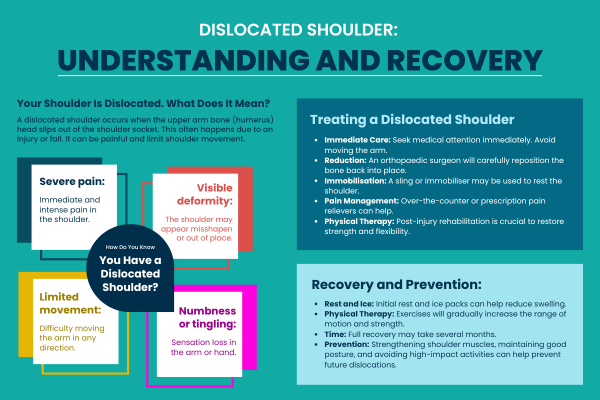
What is a shoulder dislocation?
Dislocation of the shoulder is perhaps one of the most painful experiences that a person can ever encounter. Sometimes asymptomatic, it may develop into a condition such as a frozen shoulder if not treated. The shoulder joint is highly mobile and, therefore, very susceptible to dislocation. It is best to start treatment immediately; delaying the treatment may result in a longer duration of healing with other complications.
In this blog, we will talk about the dislocated shoulder, its causes, symptoms, and treatments to emphasize the importance of proper and correct treatment.
Synopsis
What are the symptoms of a Dislocated Shoulder?
Recognising the symptoms of a dislocated shoulder is vital for seeking timely treatment. Symptoms include:
- Severe Pain: Often immediate and intense, especially during movement.
- Visible Deformity: The shoulder may appear out of place, with a noticeable bump.
- Swelling and Bruising: These can develop around the shoulder.
- Limited Mobility: Difficulty or inability to move the shoulder joint.
- Numbness and Tingling: They occur down the arm due to nerve compression.
What causes a Dislocated Shoulder?
The shoulder joint is a ball-and-socket joint that allows a wide range of motion. This mobility makes it prone to dislocation. Here are the primary causes of dislocated shoulder:
-
Trauma: a direct fall or sudden force, like a fall, car accident, or sports injury, that can dislocate the shoulder.
-
Sports Injuries: These frequently occur in sports where players engage in collisions with one another on the field, for example, football and rugby, besides being the case of overuse of the arms, swimming, and gymnastics as it contributes to shoulder dislocation.
-
Falls: Falling onto an outstretched arm or directly on the shoulder can cause dislocation.
-
Seizures or Electric Shocks: These involuntary muscle contractions can also be responsible for a milder form of dislocation shoulder dislocation.
-
Overuse: Cumulative stress from movements such as lifting items incorrectly or the demands of a given job can hurt the shoulder, making dislocation more likely.
Treatment for Dislocated Shoulder

Below are the steps and methods commonly used to treat a dislocated shoulder:
Immediate Care
-
Immobilisation: When a patient uses a sling or a splint, the shoulder is immobilized, and any movement that might lead to further injury is prevented.
-
Ice Application: Use ice pads on the infected area to reduce swelling and pain. Icing for 15-20 minutes every couple of hours is recommended for shoulder dislocation treatment.
-
Avoid Movement: The patient is asked not to use the shoulder as much as possible to prevent further damage from happening.
Medical Attention
-
Relocation: The doctor will accomplish a process by gently correcting the humerus into the socket (place a reduction).
-
Pain Management: Painkillers may be given to the patient.
Post Reduction Care
Try out the tips below to reduce joint pain and promote the recovery of the shoulder joint after its dislocation.
-
The shoulder may be fixed using a sling for some days to a few weeks to enable the process of regeneration.
-
Rest the shoulder and limit heavy lifting.
-
Apply a cold pack for 15-20 minutes and then switch to a heat pack for 10 minute, repeat application every couple of hours during the initial days of the first and second months of the recovery.
-
Take the prescribed pain relievers.
-
Do some exercises to keep the range of motion in the shoulder active.
Rehabilitation
-
Physical Therapy: A physical therapist will give you training on how to perform motions such as retracting the arms, squeezing the scapular, and turning the shoulders, gaining back the muscles that have weakened and the flexibility of the joints.
-
Gradual Progression: The treatment will usually commence with a small list of procedures (movements) and then will carry on with more difficult activities as time passes.
Dislocated shoulders, though painful, are treatable. Recognising symptoms like severe pain, deformity, and limited mobility is crucial. Early treatment by an expert orthopaedic surgeon can minimize complications and ensure a smooth recovery.
FAQ's
A fall, sudden impact, or overuse injuries from sports can dislocate your shoulder. Even seizures or electric shocks can do it!
The most important thing is to see a doctor right away! In the meantime, try to immobilise your shoulder with a sling or splint and apply ice to reduce swelling.
A doctor will gently put your shoulder joint back in place (called reduction) and give you pain medication. You might need to wear a sling for a while and do physical therapy to regain strength and mobility.



















 3 Min Read
3 Min Read










